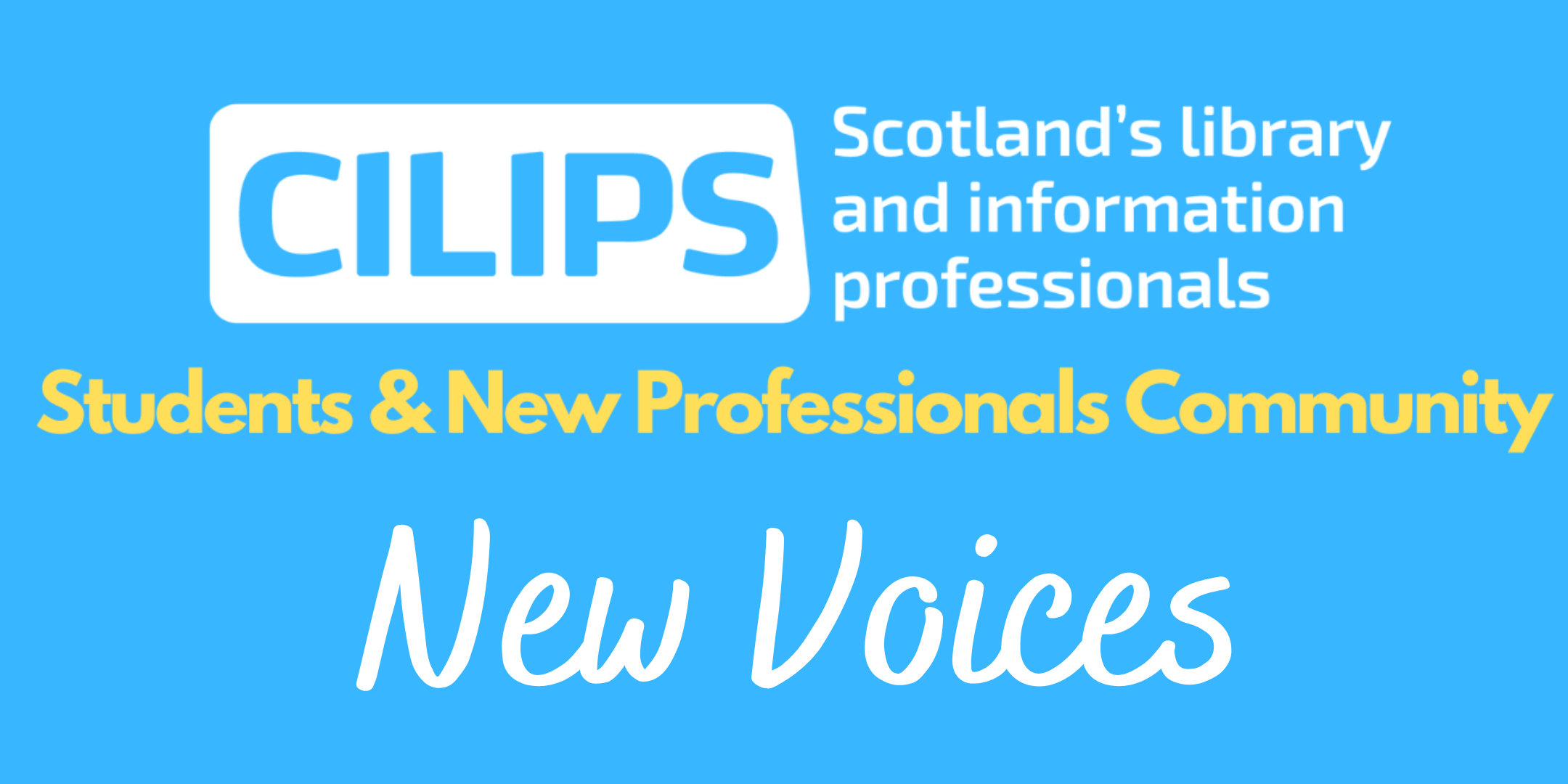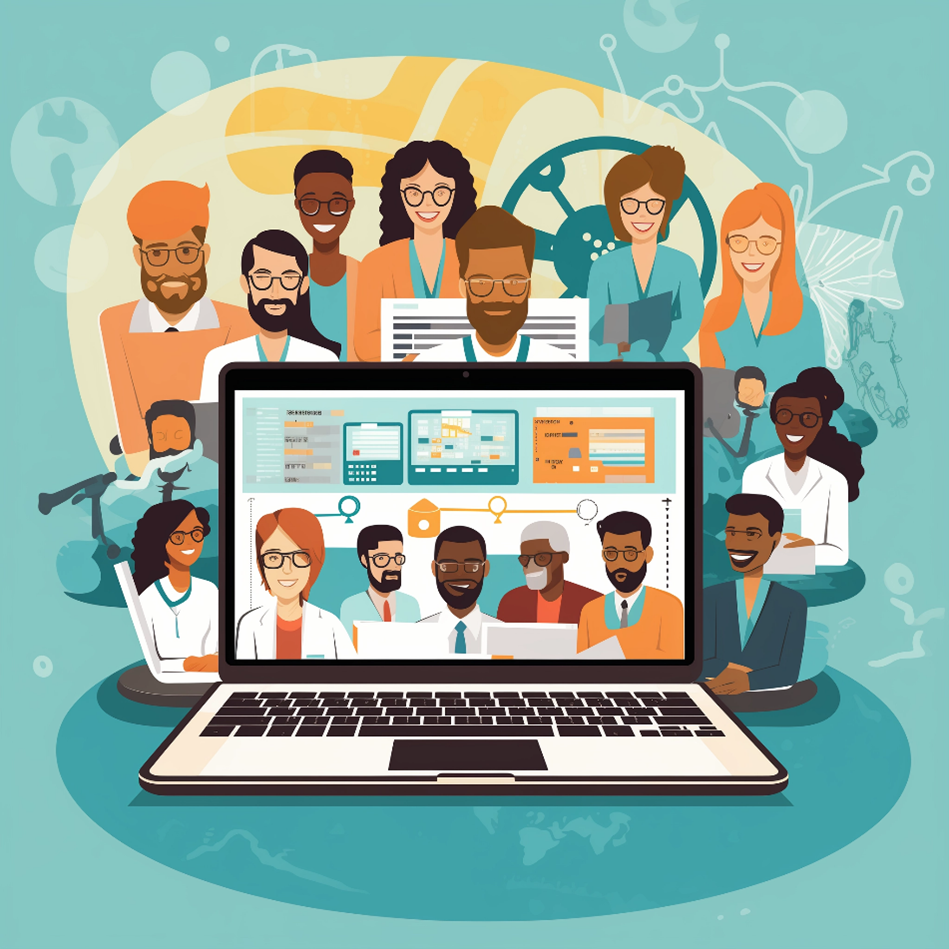New Voices RGU Student Series 2024 – Natalie Sacre
Category: Blog, New Voices, RGU Student Series 2024

In the 2024 Student Series for the New Voices blog, CILIPS Students & New Professionals Community will be sharing the views of Robert Gordon University students from the MSc in Information and Library Studies.
With special thanks to Dr Konstantina Martzoukou, Teaching Excellence Fellow and Associate Professor, for organising these thought-provoking contributions.
 Today’s blog post author is Natalie Sacre. Natalie is from the Isle of Wight and she joined the library community at the same time as commencing the RGU course, although it is a career that has always interested her. Natalie works for the Isle of Wight NHS Trust as a Trainee Clinical Librarian and so far, she is loving it! Natalie has enjoyed researching generative AI as a topic as it has challenged her perception and allowed her to delve further into the impact of her chosen concept. In her spare time, Natalie enjoys crafting, Pilates, exploring home and away, and baking for her family (her husband and two sons).
Today’s blog post author is Natalie Sacre. Natalie is from the Isle of Wight and she joined the library community at the same time as commencing the RGU course, although it is a career that has always interested her. Natalie works for the Isle of Wight NHS Trust as a Trainee Clinical Librarian and so far, she is loving it! Natalie has enjoyed researching generative AI as a topic as it has challenged her perception and allowed her to delve further into the impact of her chosen concept. In her spare time, Natalie enjoys crafting, Pilates, exploring home and away, and baking for her family (her husband and two sons).
Decoding Gen AI: Libraries as Information Sherpas
Recent years have seen a rapid growth of generative AI tools (genAI). With little in the way of guidelines and appropriate use legislation for users, there is an opportunity for information professionals to take on the role of teacher, aiding others to navigate challenges, risks and realising the potential of these innovative tools. In the context of health, the potential for genAI such as LLM (Large Language Models such as ChatGPT) to aid patients in their search for health information seems obvious. Google claimed back in 2003 that 150millon searches a day were based around health (Eysenbach and Kohler 2003). With the integration of ChatGPT into the Microsoft search engine Bing, LLM’s seem like a natural evolution of search engines.
One of the main benefits of LLM’s is the clear and concise answers they provide. Answers are given quickly and easily without the need to sieve through various sources. Yet, Generative AI throws up numerous challenges and implications, which include serious data protection and ethical concerns. LLMs are prone to bias for several reasons including, and not limited to, the under representation of certain groups in the training set, and on the part of the developer when evaluating their model, based on the information available (Webb 2023). In addition, GenAI tools do not have the capabilities to critically think. LLM’s have complex algorithms that allow them to take large quantities of data to produce text-based content (Kerner 2023). Therefore, the onus is on the user to take the information and critically analyse. For example, the information created can contain ‘hallucinations’, a term to describe when a LLM produces inaccurate or fabricated information (Lutkevich 2023). A user will only be aware of these if they know the information is incorrect. There is a danger of users taking information at face value.
To get the most from LLMs requires effort on the part of the user. Information professionals can help provide the necessary skills for effective use of genAI. Bradley (2023) suggests information professionals need to be open to assisting users with genAI or risk being left behind. The amount of (oftentimes conflicting) information available via the internet places a barrier in identifying useful and accurate information. Information professionals are an essential element in bridging these elements to facilitate the effectiveness of LLMs.
Collaboration between libraries and the NHS has been important in promoting digital health literacy to combat poor levels of health understanding. Health literacy is the term used to describe individuals’ engagement with information relating to health and the individual’s ability to make informed choices based on their understanding (WHO 2023). Information literacy is also an important and valuable skill in the information retrieval process as ‘the ability to think critically and make balanced judgements about any information we find and use. It empowers us as citizens to developed informed views and to engage fully with society.’ (CILIP 2018). However, an estimated 43% of adults living in England have difficulty interpreting and accessing health information (CILIP 2023). With the introduction of genAI, these collaborations are therefore more important than ever.

Picture 2 was created using Generative AI (Midjourney) by way of prompts. The intention of the picture is to show healthcare staff feeling confident with AI in their job roles.
Overall, LLMs are a long way off being a reliable source of health information but there is potential due to their low costs and time saving capabilities. Studies such as those by Nov, Singh and Mann 2023, show the feasibility of ChatGPT for patient-healthcare communication but also highlight the need for more research. Information professionals need to be ready to step up.
Reference List
BRADLEY , P., 2023. The future of search is intelligent . [online]. Computers in Libraries . Nottingham . Available from: www.infotoday.com/cilmag/apr23/Bradley–The-Future-of-Search-Is-Intelligent.shtml [Accessed 30 Oct 2023].
CILIP, 2023. CILIP connects librarians with NHS in Digital Health Literacy Partnership. [online]. CILIP: The Library and Information Association. London. Available from: www.cilip.org.uk/news/news.asp?id=645286&hhSearchTerms=%22nhs+and+health+literacy%22 [Accessed 30 Oct 2023].
CILIP, 2018. CILIP definition of Information Literacy 2028. [online]. CILIP: The Library and Information Association. London. [Accessed 25 Jan 2024].
EYSENBACH, G. and KOHLER, C.H., 2003. What is the prevalence of health-related searches on the World Wide Web? Qualitative and quantitative analysis of search engine queries on the internet. AMIA , 2003(225).
KERNER, S.M., 2023. large language models (LLMs). TechTarget, 13 Sep [online]. Available from: www.techtarget.com/whatis/definition/large-language-model-LLM [Accessed 23 Nov 2023].
LUTKEVICH, B., 2023. AI hallucination. TechTarget, 22 Jun [online]. Available from: www.techtarget.com/whatis/definition/AI-hallucination [Accessed 23 Nov 2023].
NOV, O., SINGH, N. and MANN, D., 2023. Putting ChatGPT’s Medical Advice to the (Turing) Test: Survey Study. JMIR Medical Education, 9, p. e46939.
WEBB, M., 2023. Exploring the potential for bias in ChatGPT. [online]. National centre for AI. Available from: https://nationalcentreforai.jiscinvolve.org/wp/2023/01/26/exploring-the-potential-for-bias-in-chatgpt/ [Accessed 23 Nov 2023].
WHO, 2023. Health literacy. [online]. World Health Organisation . Geneva . Available from: www.who.int/teams/health-promotion/enhanced-wellbeing/ninth-global-conference/health-literacy [Accessed 28 Oct 2023].
